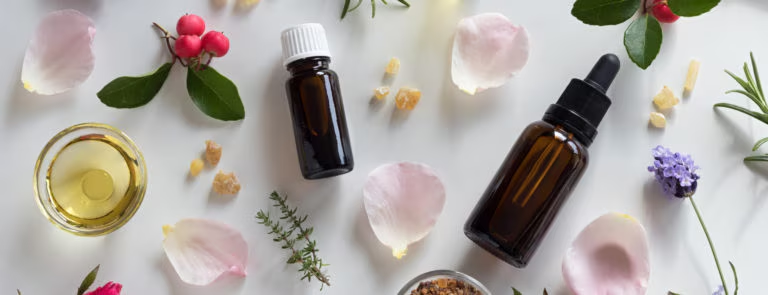1. Introduction to Organic Skincare:
Organic skincare refers to those skincare products that are made from natural ingredients obtained from organic farming. These products avoid synthetic chemicals, fragrances and preservatives and promote healthy skin as well as are environment friendly.
To make organic products artificial fertilizers, herbicides or pesticides are not used. They are made from natural butter and plants extracts which do not contain any artificial elements whereas traditional products contain preservatives, artificial perfumes, synthetic chemicals and other elements that can irritate the skin and result in long-term health problems.

2. Key Benefits of Organic Skincare:
- Healthier Ingredients: Organic skincare products are safe for the skin in the absence of harmful chemicals and synthetic ingredients. Of course, they work to reduce the risk of coming in contact with harmful substances, maintain the natural balance of the skin and much more. Organic skincare brand Excel emphasizes transparency in its ingredients list.
- Environmental Impacts: Organic farming plays an important role in conserving plant biodiversity, reducing the use of chemicals, conserving water, and healthy food systems.
- Skin Compatibility: Organic skincare products are often gentle and more suitable for sensitive skin than natural ingredients such as plant extracts, oils and butters which are less likely to harm your skin. Organic products do not contain harsh substances such as parabens, sulfates, artificial fragrances etc which can irritate sensitive skin. When organic skincare products do require preservatives, they often rely on natural alternatives such as vitamin E or rosemary extract.
3. Common Organic skincare Ingredients to Look For:
Here is a list of popular organic skincare ingredients commonly found in skin care products along with their benefits

- Jojoba Oil – Jojoba is very similar to the skin’s natural sebum, so it is useful for all skin types. It is moisturizing, non-comedogenic, and can help balance oil production.
- Coconut Oil – Coconut oil is a moisturizer and contains disease-fighting gum. It is best suited for people with normal skin, but people with acne or sensitive skin may want to do a patch-test. Coconut might be comedogenic for some people.
- Tea Tree Oil – It has anti-oxidant and anti-fungal properties. Tea tree oil is commonly used to treat acne and other skin related problems.
- Argan Oil – Argan oil is known for its high vitamin E and fatty acid content. It deeply moisturizes, helps reduce inflammation, and may improve skin tone.
- Rosehip Oil – Rich in vitamin C and E, and essential beneficial acids. Rosehip oil is known for its moisturizing and rejuvenating properties, which help reduce scars and wrinkles.
- Lavender Essential Oil – It can help to increase feelings of happiness, sleeplessness, and comfort. It is often used to soothe irritated skin.
- Chamomile Oil – Anti-inflammatory and soothing. Chamomile oil is used to soothe sensitive skin and reduce redness.
- Honey – Honey is a natural humectant that absorbs moisture from the skin, making it an excellent moisturizer. It has anti-oxidant properties that can help treat acne and other skin conditions.
- Shea Butter – Rich in vitamins E and E, Shea butter is an exceptional moisturizer that deeply hydrates the skin.
- Aloe Vera Gel– Known for its soothing and hydrating properties. Aloe Vera is excellent for soothing chapped or sunburned skin.
4. How to Choose Organic Skincare Products:
Before buying any skincare product we should think carefully and make it a habit to check for 100% organic label, look for brands that are transparent about their sourcing and production methods and can provide information to the consumer about the effectiveness of the product and the reliability of organic medicines.
5. DIY Organic Skincare Recipes:

1. How to make De-Tan scrub for face
Ingredients:
- 1 tablespoon of Rice flour
- 1 tablespoon of Red Lentils Flour
- 1 tablespoon of Coffee powder
- 2 Vitamin E Capsule
- 1 teaspoon of Rose Water
- Natural Aloe vera Gel
Instructions:
- In a small bowl, mix the Rice flour, Red Lentils Flour, Coffee Pd, Vitamin E Capsule.
- Now make a thick paste with rose water and aloe vera Gel.
- Apply the mixture to your face and scrub it.
- Leave it on for 15-20 minutes, then rinse with warm water.
Benefits: This Scrub help to remove tan and facial hair.
2. How to make skin Brightening Cream.
Ingredients:
- 1 tablespoon of Rice flour
- Saffron strand.
- 2 Vitamin E Capsule
- Rose Water
- Aloe vera Gel
Instructions:
- In a small bowl, mix the Rice flour with rose water, aloe vera Gel and Vitamin E Capsule and add 5-6 saffron strand and keep it aside for 2 hours.
- After 2 hrs milk the ingredients well again and the cream is ready
- Apply the mixture to your face in night and wash it in the morning.
Benefits: This cream help to brighten your skin naturally.
3. How to make Aloe Vera Gel at home
Ingredients:
- Fresh aloe vera leaf
Instructions:
- Cut the aloe vera leaf and cut in in 2 pieces and scoop out the clear gel inside using a spoon.
- Blend the gel to make it smooth paste like consistency.
- Store the gel in a clean container in the refrigerator.
- Apply this as a moisturiser.
Benefits: Aloe vera is known for its soothing and healing properties, making it great for sunburns, irritations, or as a general moisturizer.
6. Benefits of Herbal Ingredients in Organic Skincare:
- Natural Healing Properties: Some herbs have inherent healing properties. For example, chamomile is known for its sleep-destroying properties, which makes it ideal for soothing irritated skin.
- Rich in Antioxidants: Organic ingredients often contain antioxidants that help fight acne, which can cause premature aging. Ingredients like green tea and rosemary are rich in antioxidants that protect the skin from damage.
- Nourishing and Hydrating: Herbs such as aloe vera and calendula deeply moisturize and nourish the skin. Aloe vera is especially beneficial in soothing sunburn and keeping the skin healthy.
- Balancing Oils: Herbal treatments can help balance the skin’s oil production. For oily skin, ingredients such as witch hazel and tea tree oil can help control excess sebum, while jojoba oil mimics the skin’s natural oils, making it suitable for both dry and oily skin.
- Anti-Aging Benefits: Many herbs have anti-aging properties. For example, rosehip oil is rich in vitamin C and essential fatty acids, which improve skin elasticity and reduce fine lines.
- Customizable and Versatile: Herbal ingredients can be easily incorporated in many types of skincare products, from serums to masks. Due to their multifaceted effect, special routines can be created for skin care, which remove specific skin related problems.
- Fewer Chemicals: Herbal treatments are often less likely to cause irritation or allergies than synthetic products. This makes them a better option for sensitive skin.
7. Conclusion:
Adopting organic skincare is not just a personal preference; it is a commitment to your health and the well-being of our home. Some reasons to consider this positive change are: health enhancing elements, gentle on sensitive skin, environmental impact, supporting ethical practices, encouraging sustainable soundness, empowerment through knowledge. Adopting organic skincare is a meaningful step towards improving your health and supporting a more sustainable future. By prioritizing organic products, you’re investing in your health and having a positive impact on the world around you. So why not take this step today? Embrace the benefits of organic skincare and join a growing community dedicated to health, beauty and stability. Your skin—and the planet—will thank you!
This topic will not only be informative, but will also appeal to readers interested in natural and sustainable beauty practices!
What are the main benefits of using organic skincare products
Organic skincare products are often gentler on the skin, reducing the risk of irritation and allergic reactions. They typically contain less harmful chemicals and toxins, making them safer for both your skin and the environment.
Have a look on some organic product from here https://leafyherbs.faritone.com/shop/
Related link https://www.onegreenplanet.org/lifestyle/benefits-of-organic-and-natural-skincare/
For News https://faritone.com